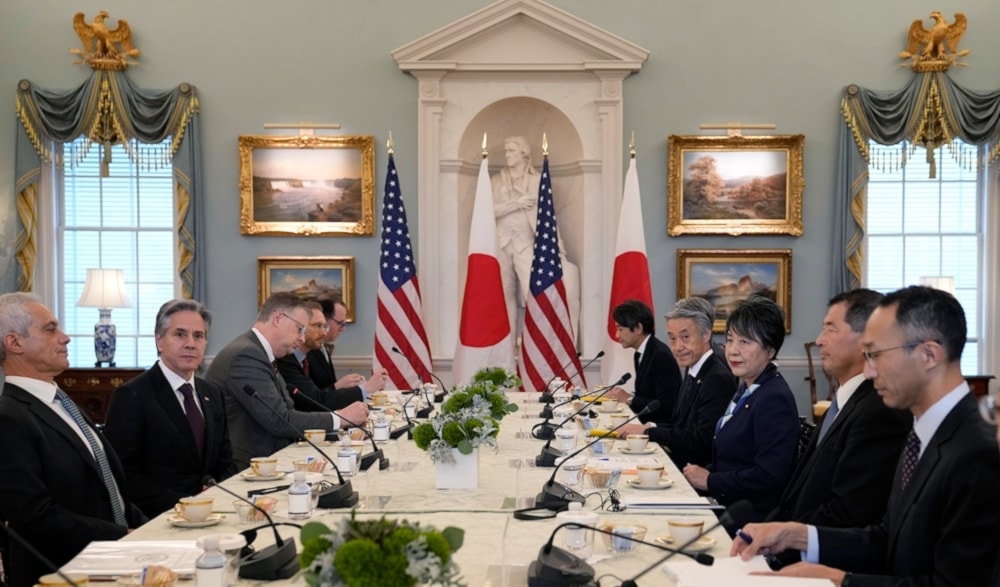Nuclear weapons included in methods US will vow to use to defend Japan
Japan and the United States are set to draft their first joint document on expanded deterrence policy.
-

Secretary of State Antony Blinken, second from left, meets with Japanese Foreign Minister Yoko Kamikawa, third from right, at the State Department in Washington, Friday, January 12, 2024. (AP)
Japan and the United States will draft their first joint document on expanded deterrence policy, which will include a clause affirming the United States' commitment to defend Japan by various means, including nuclear weapons, Japanese newspaper Yomiuri Shimbun reported, citing sources.
The document, as per the newspaper, will outline both nations' positions on implementing deterrence policy and will specify the US determination to enhance regional deterrence for Japan, detailing the measures Washington can employ in both peacetime and potential emergencies.
The document will also detail the scenarios under which the United States can retaliate against third countries on behalf of Japan and outline potential responses, according to the newspaper.
It is worth noting that the Japanese and US defense chiefs are set to discuss the document's contents during a meeting in Tokyo in late July.
In 2010, the Japanese and US governments created the Extended Deterrence Dialogue to explore methods for maintaining and enhancing extended deterrence. They began to hold regular consultations on this matter, involving officials responsible for foreign policy and defense affairs.
Japan wary of joining fight over Taiwan alongside allies vs China: WSJ
For over a year, American and Japanese military officials have been engaged in discussions regarding a plan for a potential conflict over Taiwan.
However, the central question of whether Japan would join the fight remains unresolved, as Tokyo faces challenges due to its economic ties with Russia and concerns about public opinion against getting involved in the conflict, The Wall Street Journal reported last week.
Japan, located just 110 km from Taiwan and hosting a significant presence of US troops (54,000), plays a crucial role in the US strategy of counteracting China, with potential bases for an initial response, but Japan's approval would be required under a longstanding agreement with the US while its refusal could jeopardize the alliance.
The military forces of Japan, referred to as the Self-Defense Forces, currently possess a fleet of 50 destroyers, 22 attack submarines, and over 300 jet fighters. In late 2022, the Japanese government announced its intention to increase military spending by approximately 60% over the next five years, with the goal of reaching a budget equivalent to 2% of the country's gross domestic product.
While Japan has invested in defense capabilities and possesses the ability to respond militarily if a close ally is under attack, concerns over escalation, including potential attacks from China's allies or the use of nuclear weapons, weigh heavily on Tokyo's hesitancy.
It would prove challenging to convince Japan to participate directly in the conflict, the WSJ revealed, as Japanese leaders avoid public discourse on their involvement in a potential Taiwan war, largely due to widespread public opposition.
“If you ask the question of whether you are willing to risk your life to defend Taiwan, I think 90% of Japanese people would say ‘no’ at this point,” said Satoru Mori, a professor of politics at Keio University in Tokyo.
A spokesperson from the Pentagon claimed that the United States and Japan are dedicated to maintaining peace in the Taiwan Strait and that the US embraces Japan's desire to broaden its roles, missions, and capabilities, recognizing that this would contribute to strengthening deterrence in the region.
The US is seeking clarity from Japan as the two sides develop an operational plan for a potential military conflict over Taiwan. While the US hopes Japan would assist in covering various logistical aspects such as supply routes, missile-launcher sites, and refugee-evacuation plans, Japan expresses its willingness to support the US military through provisions like fuel and supplies.
However, the lack of meaningful public discussion in Japan about explicit readiness to support the US in the event of a war over Taiwan raises concerns of potential political chaos and challenges in managing the US alliance amid public concern.
Despite Japan's military buildup and increased defense budget, decision-making may be hindered by civilian controls imposed after World War II, which could impact timely responses in a critical situation, while Japan aims to avoid frontline involvement in the conflict.

 4 Min Read
4 Min Read








